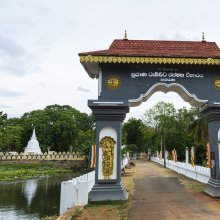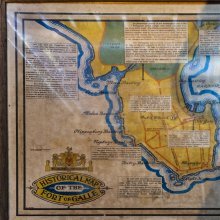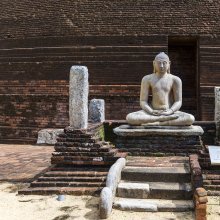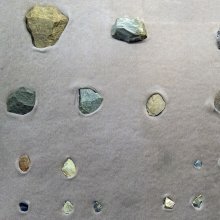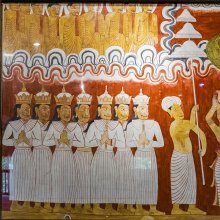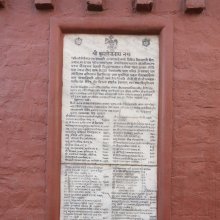Aitihasika, Aitihāsika: 11 definitions
Introduction:
Aitihasika means something in Hinduism, Sanskrit, Hindi. If you want to know the exact meaning, history, etymology or English translation of this term then check out the descriptions on this page. Add your comment or reference to a book if you want to contribute to this summary article.
Alternative spellings of this word include Etihasik.
Images (photo gallery)
(+10 more images available)
In Hinduism
Mīmāṃsā (school of philosophy)
Source: Srimatham: Mīmāṃsa: The Study of Hindu ExegesisAitihāsika (ऐतिहासिक, “polytheism”).—Some scholars accepted the Vedic gods (devas) as realities, as administrative cosmic forces, their battles with the anti-gods (asuras) as real incidents, and the rituals taught in the Vedas as effective acts of propitiation and worship. The various gods are worshipped in different ways to gain specific desirable material ends and some gods such as Rudra are propitiated in order to avert harm, sickness and untimely death. Most of the early Western scholars viewed the Vedas and the Vedic religion from this angle.

Mimamsa (मीमांसा, mīmāṃsā) refers to one of the six orthodox Hindu schools of philosophy, emphasizing the nature of dharma and the philosophy of language. The literature in this school is also known for its in-depth study of ritual actions and social duties.
Languages of India and abroad
Sanskrit dictionary
Source: DDSA: The practical Sanskrit-English dictionaryAitihāsika (ऐतिहासिक).—a. (-kī f.) [इतिहास-ठक् (itihāsa-ṭhak)]
1) Traditional.
2) Historical
-kaḥ 1 An historian.
2) One who knows or studies ancient legends.
Source: Cologne Digital Sanskrit Dictionaries: Shabda-Sagara Sanskrit-English DictionaryAitihāsika (ऐतिहासिक).—mfn.
(-kaḥ-kī-kaṃ) Historical. m.
(-kaḥ) A historian. E. itihāsa a story, and ṭhak aff.
Source: Cologne Digital Sanskrit Dictionaries: Benfey Sanskrit-English DictionaryAitihāsika (ऐतिहासिक).—i. e. itihāsa + ika, adj. Occurring in old legends, [Prabodhacandrodaya, (ed. Brockhaus.)] 91, 7.
Source: Cologne Digital Sanskrit Dictionaries: Cappeller Sanskrit-English DictionaryAitihāsika (ऐतिहासिक).—[feminine] i relater of old legends.
Source: Cologne Digital Sanskrit Dictionaries: Monier-Williams Sanskrit-English Dictionary1) Aitihāsika (ऐतिहासिक):—mf(ī)n. ([from] iti-hāsa), derived from ancient legends, legendary, historical, traditional, [Sāyaṇa; Prabodha-candrodaya]
2) m. one who relates or knows ancient legends
3) an historian.
Source: Cologne Digital Sanskrit Dictionaries: Yates Sanskrit-English DictionaryAitihāsika (ऐतिहासिक):—(kaḥ) 1. m. An historian. a. Historical.
[Sanskrit to German]
Sanskrit, also spelled संस्कृतम् (saṃskṛtam), is an ancient language of India commonly seen as the grandmother of the Indo-European language family (even English!). Closely allied with Prakrit and Pali, Sanskrit is more exhaustive in both grammar and terms and has the most extensive collection of literature in the world, greatly surpassing its sister-languages Greek and Latin.
Hindi dictionary
Source: DDSA: A practical Hindi-English dictionaryAitihāsika (ऐतिहासिक) [Also spelled etihasik]:—(a) historic, historical; ~[tā] historicity; historical genuineness; —[yuga] historic age.
...
Kannada-English dictionary
Source: Alar: Kannada-English corpusAitihāsika (ಐತಿಹಾಸಿಕ):—
1) [adjective] historical of, relating to or having the character of history; b) based on history; c) used in the past and reproduced in historical presentations.
2) [adjective] historic a) famous or important in history; b) having great and lasting importance as an historic occasion.
Kannada is a Dravidian language (as opposed to the Indo-European language family) mainly spoken in the southwestern region of India.
See also (Relevant definitions)
Starts with: Aitihasika-bhashiki, Aitihasika-bhautikavada, Aitihasika-citra, Aitihasika-pariprekshya, Aitihasika-vyakarana, Aitihasikata, Aitihasikate.
Ends with: Anaitihasika, Pragaitihasika.
Full-text: Aitihasika-bhautikavada, Aitihaasik, Etihasik, Vyakarana, Vyakaran.
Relevant text
Search found 4 books and stories containing Aitihasika, Aitihāsika; (plurals include: Aitihasikas, Aitihāsikas). You can also click to the full overview containing English textual excerpts. Below are direct links for the most relevant articles:
Rig Veda (translation and commentary) (by H. H. Wilson)
Rig Veda 1.89.3 < [Sukta 89]
Puranic encyclopaedia (by Vettam Mani)
Charaka Samhita and Sushruta Samhita (by Nayana Sharma)
Rudra-Śiva in the Medical Texts < [Chapter 8]
Some Thoughts on the Veda and its Study < [January – March, 1978]
